美国100位历史名人榜(38):Susan B. Anthony
改变世界历史进程的100位伟人有哪些
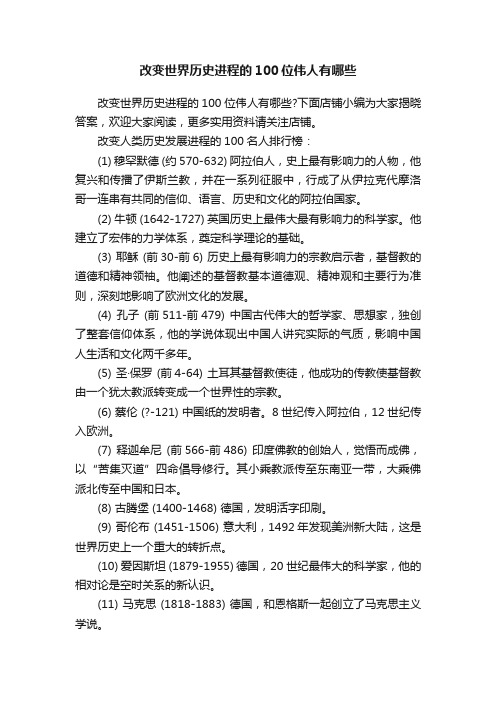
改变世界历史进程的100位伟人有哪些改变世界历史进程的100位伟人有哪些?下面店铺小编为大家揭晓答案,欢迎大家阅读,更多实用资料请关注店铺。
改变人类历史发展进程的100名人排行榜:(1) 穆罕默德 (约570-632) 阿拉伯人,史上最有影响力的人物,他复兴和传播了伊斯兰教,并在一系列征服中,行成了从伊拉克代摩洛哥一连串有共同的信仰、语言、历史和文化的阿拉伯国家。
(2) 牛顿 (1642-1727) 英国历史上最伟大最有影响力的科学家。
他建立了宏伟的力学体系,奠定科学理论的基础。
(3) 耶稣 (前30-前6) 历史上最有影响力的宗教启示者,基督教的道德和精神领袖。
他阐述的基督教基本道德观、精神观和主要行为准则,深刻地影响了欧洲文化的发展。
(4) 孔子(前511-前479) 中国古代伟大的哲学家、思想家,独创了整套信仰体系,他的学说体现出中国人讲究实际的气质,影响中国人生活和文化两千多年。
(5) 圣·保罗 (前4-64) 土耳其基督教使徒,他成功的传教使基督教由一个犹太教派转变成一个世界性的宗教。
(6) 蔡伦 (?-121) 中国纸的发明者。
8世纪传入阿拉伯,12世纪传入欧洲。
(7) 释迦牟尼(前566-前486) 印度佛教的创始人,觉悟而成佛,以“苦集灭道”四命倡导修行。
其小乘教派传至东南亚一带,大乘佛派北传至中国和日本。
(8) 古腾堡 (1400-1468) 德国,发明活字印刷。
(9) 哥伦布 (1451-1506) 意大利,1492年发现美洲新大陆,这是世界历史上一个重大的转折点。
(10) 爱因斯坦 (1879-1955) 德国,20世纪最伟大的科学家,他的相对论是空时关系的新认识。
(11) 马克思 (1818-1883) 德国,和恩格斯一起创立了马克思主义学说。
(12) 巴斯德 (1882-1895) 法国,在医学史上首次倡导疾病细菌学说。
(13) 伽利略 (1564-1642) 意大利,对现实科学法轮的创立起了最大的作用。
世界100位大文豪排行榜
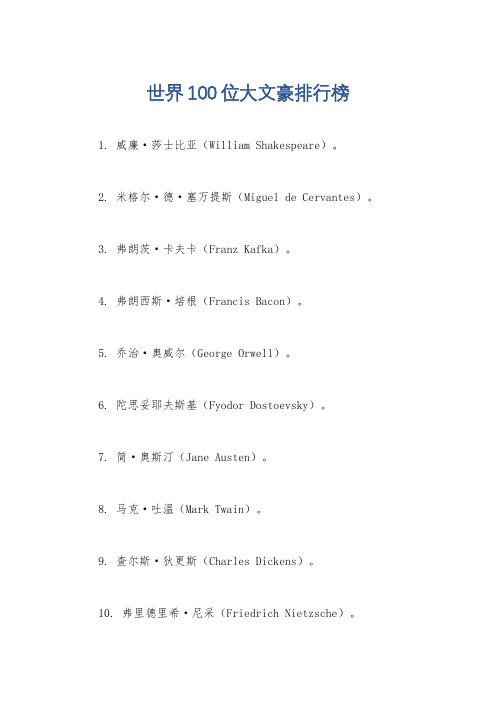
世界100位大文豪排行榜1. 威廉·莎士比亚(William Shakespeare)。
2. 米格尔·德·塞万提斯(Miguel de Cervantes)。
3. 弗朗茨·卡夫卡(Franz Kafka)。
4. 弗朗西斯·培根(Francis Bacon)。
5. 乔治·奥威尔(George Orwell)。
6. 陀思妥耶夫斯基(Fyodor Dostoevsky)。
7. 简·奥斯汀(Jane Austen)。
8. 马克·吐温(Mark Twain)。
9. 查尔斯·狄更斯(Charles Dickens)。
10. 弗里德里希·尼采(Friedrich Nietzsche)。
11. 奥斯卡·王尔德(Oscar Wilde)。
12. 福楼拜(Victor Hugo)。
13. 埃米莉·勃朗特(Emily Bronte)。
14. 托尔斯泰(Leo Tolstoy)。
15. 奥古斯特·斯特林伯格(August Strindberg)。
16. 纳撒尼尔·霍桑(Nathaniel Hawthorne)。
17. 路易斯·卡罗尔(Lewis Carroll)。
18. 威廉·福克纳(William Faulkner)。
19. 哈尔德·斯塔克·维克(Halldór Laxness)。
20. 弗拉基米尔·纳博科夫(Vladimir Nabokov)。
21. 纪德(J.D. Salinger)。
22. 约翰·斯坦贝克(John Steinbeck)。
23. 弗朗茨·冯·克拉克(Franz von Dingelstedt)。
24. 约瑟夫·康拉德(Joseph Conrad)。
25. 詹姆斯·乔伊斯(James Joyce)。
影响美国的100位人物

根据互联网资料编制2010.11点击鼠标翻页•2006年底,美国的权威期刊《大西洋月刊》编辑部邀请十位著名历史学家,其中有四位是普利策奖获得者,投票选举100位美国历史上最具影响力的人物。
•关于“影响”的定义•专家们的依据之一是人物的综合影响力。
•第二个依据来自流行文化。
•但市场并不是万能钥匙,道德标准必须考虑。
历史功勋中的政治因素也是评判的标准之一。
•专家们认为:伟大的公众人物应该给人们的生活带来巨大的变化,从物质、精神和文化层面影响了美国。
•也许这个排行榜里没有你喜欢的人物,如克林顿、施瓦辛格、斯皮尔伯格、拳王阿里、“飞人”乔丹等,他们的魅力系数并不比排行榜中的大多数人物低,只是对历史人物的评价往往不是同一时代的历史学家敢贸然判定的。
•亚伯拉罕·林肯(1809~1865):拯救了国家,解放了黑奴,再造了美国。
№1亚伯拉罕·林肯•乔治·华盛顿(1732~1799):缔造了美利坚合众国,赶走了一个国王,也拒绝成为国王。
№2乔治·华盛顿•托马斯·杰斐逊(1743~1826):《独立宣言》主要起草人,写下了美国历史上分量最重的五个字:“人生而平等”。
№3.托马斯·杰斐逊•富兰克林·罗斯福(1882~1945):他告诫逆境中的美国:“我们唯一恐惧的就是恐惧本身”。
№4.富兰克林·罗斯福•亚历山大·汉密尔顿(1755~1804):战士、银行家、科学家、政治家,他带领美国从农业社会走向了工业社会。
№5.亚历山大·汉密尔顿•本杰明·富兰克林(1706~1790):科学家、作家,发明家、外交家。
№6.本杰明·富兰克林•约翰·马歇尔(1755~1835):美国最高法院首席法官,三权分立制度的主要创建人。
№7.约翰·马歇尔•小马丁·路德·金(1929~1968):用慷慨激昂的演讲,抒发种族平等的梦想,虽然道路漫长而艰险,但没有其他人能比他看得更高,走得更远。
美国历史上最有影响的100个人
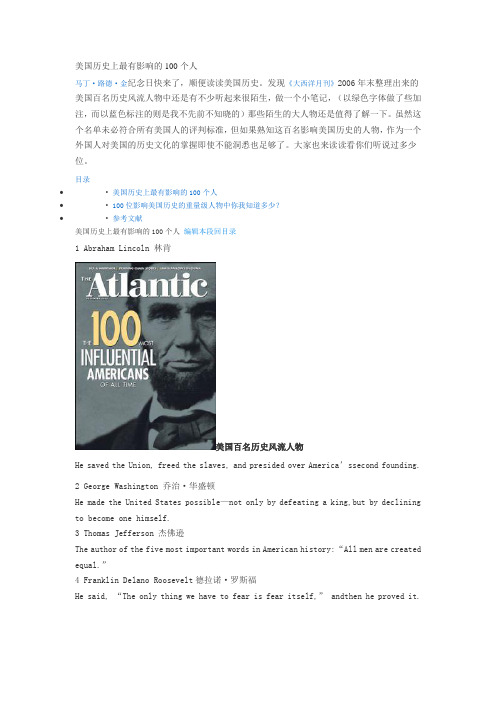
美国历史上最有影响的100个人马丁·路德·金纪念日快来了,顺便读读美国历史。
发现《大西洋月刊》2006年末整理出来的美国百名历史风流人物中还是有不少听起来很陌生,做一个小笔记,(以绿色字体做了些加注,而以蓝色标注的则是我不先前不知晓的)那些陌生的大人物还是值得了解一下。
虽然这个名单未必符合所有美国人的评判标准,但如果熟知这百名影响美国历史的人物,作为一个外国人对美国的历史文化的掌握即使不能洞悉也足够了。
大家也来读读看你们听说过多少位。
目录∙•美国历史上最有影响的100个人∙•100位影响美国历史的重量级人物中你我知道多少?∙•参考文献美国历史上最有影响的100个人编辑本段回目录1 Abraham Lincoln 林肯美国百名历史风流人物He saved the Union, freed the slaves, and presided over America’ssecond founding.2 George Washington 乔治·华盛顿He made the United States possible—not only by defeating a king,but by declining to become one himself.3 Thomas Jefferson 杰佛逊The author of the five most important words in American history:“All men are created equal.”4 Franklin Delano Roosevelt德拉诺·罗斯福He said, “The only thing we have to fear is fear itself,” andthen he proved it.5 Alexander Hamilton 亚历山大·汉密尔顿Soldier, banker, and political scientist, he set in motion anagrarian nation’s transformation into an industrial power.6 Benjamin Franklin 富兰克林The Founder-of-all-trades— scientist, printer, writer, diplomat,inventor, and more; like his country, he contained multitudes.7 John Marshall 约翰·马歇尔The defining chief justice, he established the Supreme Court as theequal of the other two federal branches.8 Martin Luther King Jr.马丁·路德·金His dream of racial equality is still elusive, but no one did moreto make it real.9 Thomas Edison 爱迪生·托马斯It wasn’t just the lightbulb; the Wizard of Menlo Park was themost prolific inventor in American history.10 Woodrow Wilson 威尔逊He made the world safe for U.S. interventionism, if not fordemocracy.11 John D. Rockefeller 约翰·洛克菲勒The man behind Standard Oil set the mold for our tycoons—first bymaking money, then by giving it away.12 Ulysses S. Grant 尤利西斯·格兰特He was a poor president, but he was the general Lincoln needed; healso wrote the greatest political memoir in American history.13 James Madison 詹姆斯·麦迪逊He fathered the Constitution and wrote the Bill of Rights.14 Henry Ford福特·亨利He gave us the assembly line and the Model T, and sparkedAmerica’s love affair with the automobile.15 Theodore Roosevelt 罗斯福Whether busting trusts or building canals, he embodied the“strenuous life” and blazed a trail for twentieth-centuryAmerica.16 Mark Twain 马克吐温Author of our national epic, he was the most unsentimental observerof our national life.17 Ronald Reagan 里根The amiable architect of both the conservative realignment and theCold War’s end.18 Andrew Jackson杰克逊18年The first great populist: he found America a republic and left it ademocracy.19 Thomas Paine 托马斯paineThe voice of the American Revolution, and our first greatradical.20 Andrew Carnegie 卡内基The original self-made man forged America’s industrial might andbecame one of the nation’s greatest philanthropists.21 Harry Truman 亨利杜鲁门An accidental president, this machine politician ushered in theAtomic Age and then the Cold War.22 Walt Whitman ,惠特曼He sang of America and shaped the country’s conception ofitself.23 Wright Brothers 赖特兄弟They got us all off the ground.24 Alexander Graham Bell亚历山大·格雷厄姆By inventing the telephone, he opened the age of telecommunicationsand shrank the world.25 John Adams亚当斯约翰His leadership made the American Revolution possible; his devotionto republicanism made it succeed.26 Walt Disney 迪士尼The quintessential entertainer-entrepreneur, he wielded unmatchedinfluence over our childhood.27 Eli Whitney ?艾惠His gin made cotton king and sustained an empire for slavery.28 Dwight Eisenhower 艾森豪威尔He won a war and two elections, and made everybody like Ike.29 Earl Warren 厄尔华伦His Supreme Court transformed American society and bequeathed to usthe culture wars.30 Elizabeth Cady Stanton伊丽莎白卡迪stantonOne of the first great American feminists, she fought for socialreform and women’s right to vote.31 Henry Clay 亨利粘土One of America’s greatest legislators and orators, he forgedcompromises that held off civil war for decades.32 Albert Einstein 爱因斯坦His greatest scientific work was done in Europe, but his humanityearned him undying fame in America.33 Ralph Waldo Emerson 爱默生The bard of individualism, he relied on himself—and told us all todo the same.34 Jonas Salk 盟瘟His vaccine for polio eradicated one of the world’s worstplagues.35 Jackie Robinson 济臣He broke baseball’s color barrier and embodied integration’spromise.36 William Jennings Bryan 威廉吉·布莱恩“The Great Commoner” lost three presidential elections, but hispopulism transformed the country."37 J. P. Morgan 摩根大通The great financier and banker was the prototype for all the WallStreet barons who followed.38 Susan B. Anthony 苏珊乙安东尼She was the country’s most eloquent voice for women’s equalityunder the law.39 Rachel Carson卡森雷切尔The author of Silent Spring was godmother to the environmentalmovement.<40 John Dewey 杜威He sought to make the public school a training ground fordemocratic life.41 Harriet Beecher Stowe的Harriet格尔斯托Her Uncle Tom’s Cabin inspired a generation of abolitionists andset the stage for civil war.42 Eleanor Roosevelt 罗斯福She used the first lady’s office and the mass media to become“first lady of the world.”43 W. E. B. DuBois 特约e.乙杜波伊斯One of America’s great intellectuals, he made the “problem of thecolor line” his life’s work.44 Lyndon Baines Johnson 贝恩斯约翰逊His brilliance gave us civil-rights laws; his stubbornness gave usVietnam.45 Samuel F. B. Morse 塞缪尔莫尔斯乙六Before the Internet, there was Morse code.46 William Lloyd Garrison 威廉劳埃德驻军Through his newspaper, The Liberator , he became the voice ofabolition.47 Frederick Douglass 道格拉斯After escaping from slavery, he pricked the nation’s consciencewith an eloquent accounting of its crimes.48 Robert Oppenheimer 奥本海默The father of the atomic bomb and the regretful midwife of thenuclear era.49 Frederick Law Olmsted 法检欧姆斯德The genius behind New York’s Central Park, he inspired thegreening of America’s cities.50 James K. Polk 詹姆斯悦结论POLKThis one-term president’s Mexican War landgrab gave us California,Texas, and the Southwest.51 Margaret Sanger 霭桑戈The ardent champion of birth control—and of the sexual freedomthat came with it.52 Joseph Smith 约瑟夫·史密斯The founder of Mormonism, America’s most famous homegrownfaith.53 Oliver Wendell Holmes Jr.霍姆斯保守派苦海wendellKnown as “The Great Dissenter,” he wrote Supreme Court opinionsthat continue to shape American jurisprudence.54 Bill Gates 盖茨The Rockefeller of the Information Age, in business andphilanthropy alike.55 John Quincy Adams 约翰-昆西·亚当The Monroe Doctrine’s real author, he set nineteenth-centuryAmerica’s diplomatic- course.56 Horace Mann 贺拉斯·曼His tireless advocacy of universal public schooling earned him thetitle “The Father of American Education.”57 Robert E. Lee 罗伯特李e.He was a good general but a better symbol, embodying conciliationin defeat.58 John C. Calhoun 约翰丙卡尔洪The voice of the antebellum South, he was slavery’s most ardentdefender.59 Louis Sullivan沙利文路易The father of architectural modernism, he shaped the definingAmerican building: the skyscraper.60 William Faulkner 福克纳The most gifted chronicler of America’s tormented and fascinatingSouth.61 Samuel Gompers 塞缪尔gompersThe country’s greatest labor organizer, he made the golden age ofunions possible.62 William James 威廉詹姆斯The mind behind Pragmatism, America’s most important philosophicalschool.63 George Marshall 马歇尔乔治As a general, he organized the American effort in World War II; asa statesman, he rebuilt Western Europe.64 Jane Addams 阿珍addamsThe founder of Hull House, she became the secular saint of socialwork.65 Henry David Thoreau 亨利大卫梭罗The original American dropout, he has inspired seekers ofauthenticity for 150 years.66 Elvis Presley 猫王The king of rock and roll.67 P. T. Barnum 第汤匙barnumThe circus impresario’s taste for spectacle paved the way forblockbuster movies and reality TV.68 James D. Watson 理丁沃森He codiscovered DNA’s double helix, revealing the code of life toscientists and entrepreneurs alike.69 James Gordon Bennett詹姆斯治疗Bennett戈登As the founding publisher of The New York Herald , he invented themodern American newspaper.70 Lewis and Clark 刘易斯和克拉克They went west to explore, and millions followed in their wake.71 Noah Webster71年诺亚韦伯斯特He didn’t create American English, but his dictionary definedit.72 Sam Walton 萨姆尔登He promised us “Every Day Low Prices,” and we took him up on theoffer.73 Cyrus McCormick 鲁士和McCormickHis mechanical reaper spelled the end of traditional farming, andthe beginning of industrial agriculture.74 Brigham Young 翰What Joseph Smith founded, Young preserved, leading the Mormons totheir promised land.75 George Herman “Babe” Ruth乔治赫尔曼"贝"罗思He saved the national pastime in the wake of the Black Soxscandal—and permanentl-y linked sports and celebrity.76 Frank Lloyd Wright 赖特America’s most significant architect, he was the archetype of thevisionary artist at odds with capitalism.77 Betty Friedan 傅瑞She spoke to the discontent of housewives everywhere—and inspireda revolution in gender roles.78 John Brown 约翰-布朗Whether a hero, a fanatic, or both, he provided the spark for theCivil War.79 Louis Armstrong斯特朗路易His talent and charisma took jazz from the cathouses of Storyvilleto Broadway, television, and beyond.80 William Randolph Hearst 威廉道夫hearstThe press baron who perfected yellow journalism and helped startthe Spanish-American War.81 Margaret Mead 霭蜂蜜With Coming of Age in Samoa , she made anthropology relevant—andcontroversial.82 George Gallup 乔治·盖洛普He asked Americans what they thought, and the politicianslistened.83 James Fenimore Cooper 库柏The novels are unreadable, but he was the first great mythologizerof the frontier.84 Thurgood Marshall thurgood马歇尔As a lawyer and a Supreme Court justice, he was the legal architectof the civil-rights revolution.85 Ernest Hemingway 海明威His spare style defined American modernism, and his life mademachismo a cliché.86 Mary Baker Eddy 玛丽·贝克·涡She got off her sickbed and founded Christian Science, whichpromised spiritual healing to all.87 Benjamin Spock 开展SPOCK·本杰明With a single book—and a singular approach—he changed Americanparenting.88 Enrico Fermi 费米师EnricoA giant of physics, he helped develop quantum theory and wasinstrumental in building the atomic bomb.89 Walter Lippmann 李普曼The last man who could swing an election with a newspapercolumn.90 Jonathan Edwards 乔纳森爱德华Forget the fire and brimstone: his subtle eloquence made him thecountry’s most influential theologian.91 Lyman Beecher 曼格尔Harriet Beecher Stowe’s clergyman father earned fame as anabolitionist and an evangelist.92 John Steinbeck 斯坦贝克As the creator of Tom Joad, he chronicled Depression-eramisery.93 Nat Turner 奈特·特纳He was the most successful rebel slave; his specter would stalk thewhite South fora century.94 George Eastman 乔治·伊士曼The founder of Kodak democratized photography with his handy rollsof film.95 Sam Goldwyn 萨姆goldwynA producer for forty years, he was the first great Hollywoodmogul.96 Ralph Nader 拉尔夫·纳德He made the cars we drive safer; thirty years later, he made GeorgeW. Bush the president.97 Stephen Foster 斯蒂芬·福斯特America’s first great songwriter, he brought us “Susanna” and“My Old Kentucky Home.”susanna98 Booker T. Washington 布汤匙·华盛顿As an educator and a champion of self-help, he tried to lead blackAmerica up from slavery.99 Richard Nixon 尼克松He broke the New Deal majority, and then broke his presidency on ascandal that still haunts America.100 Herman Melville 赫尔曼·梅尔维尔Moby Dick was a flop at the time, but Melville is remembered as theAmerican Shakespeare.100位影响美国历史的重量级人物中你我知道多少?编辑本段回目录The Top 100 by The AtlanticThe most influential figures in American history.1 Abraham LincolnHe saved the Union, freed the slaves, and presided over America’s second founding.2 George WashingtonHe made the United States possible—not only by defeating a king, but by declining to become one himself.3 Thomas JeffersonThe author of the five most important words in American history: “All men are created equal.”4 Franklin Delano RooseveltHe said, “The only thing we have to fear is fear itself,” and then he proved it.5 Alexander HamiltonSoldier, banker, and political scientist, he set in motion an agrarian nation’s transformation into an industrial power. 你信不信此人是诗坛情种徐志摩早年的偶像之一,徐的剑桥岁月前有一段美国留学生活学习政治经济,就是想成为中国的汉弥尔顿。
影响美国的100位人物
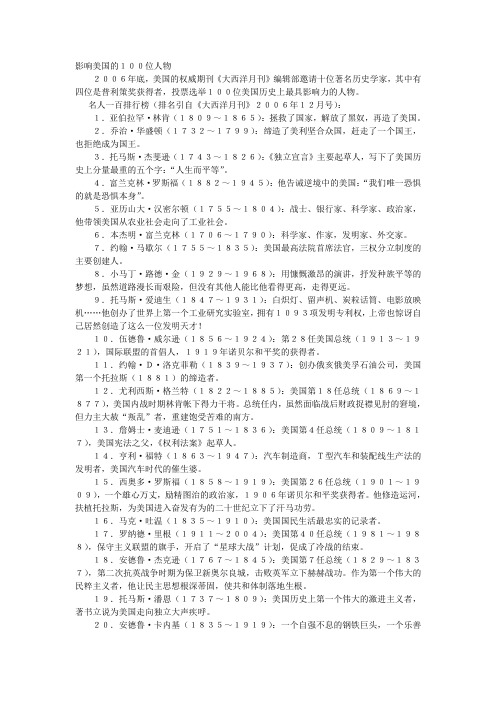
影响美国的100位人物2006年底,美国的权威期刊《大西洋月刊》编辑部邀请十位著名历史学家,其中有四位是普利策奖获得者,投票选举100位美国历史上最具影响力的人物。
名人一百排行榜(排名引自《大西洋月刊》2006年12月号):1.亚伯拉罕·林肯(1809~1865):拯救了国家,解放了黑奴,再造了美国。
2.乔治·华盛顿(1732~1799):缔造了美利坚合众国,赶走了一个国王,也拒绝成为国王。
3.托马斯·杰斐逊(1743~1826):《独立宣言》主要起草人,写下了美国历史上分量最重的五个字:“人生而平等”。
4.富兰克林·罗斯福(1882~1945):他告诫逆境中的美国:“我们唯一恐惧的就是恐惧本身”。
5.亚历山大·汉密尔顿(1755~1804):战士、银行家、科学家、政治家,他带领美国从农业社会走向了工业社会。
6.本杰明·富兰克林(1706~1790):科学家、作家,发明家、外交家。
7.约翰·马歇尔(1755~1835):美国最高法院首席法官,三权分立制度的主要创建人。
8.小马丁·路德·金(1929~1968):用慷慨激昂的演讲,抒发种族平等的梦想,虽然道路漫长而艰险,但没有其他人能比他看得更高,走得更远。
9.托马斯·爱迪生(1847~1931):白炽灯、留声机、炭粒话筒、电影放映机……他创办了世界上第一个工业研究实验室,拥有1093项发明专利权,上帝也惊讶自己居然创造了这么一位发明天才!10.伍德鲁·威尔逊(1856~1924):第28任美国总统(1913~1921),国际联盟的首倡人,1919年诺贝尔和平奖的获得者。
11.约翰·D·洛克菲勒(1839~1937):创办俄亥俄美孚石油公司,美国第一个托拉斯(1881)的缔造者。
12.尤利西斯·格兰特(1822~1885):美国第18任总统(1869~1877),美国内战时期林肯帐下得力干将。
影响美国的100位人物
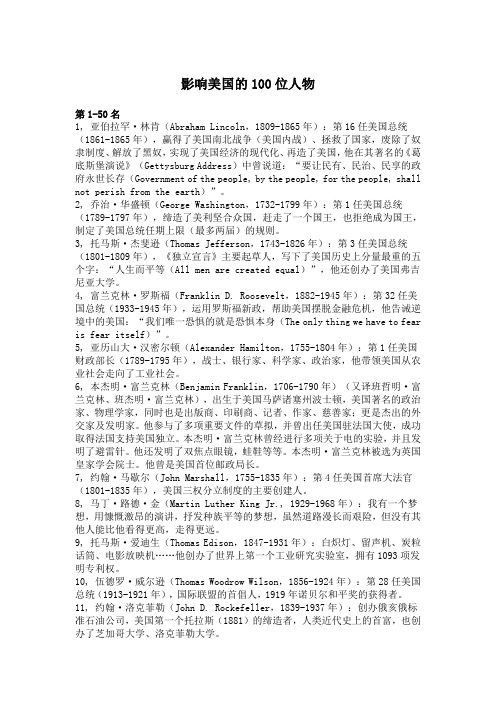
影响美国的100位人物第1-50名1, 亚伯拉罕·林肯(Abraham Lincoln,1809-1865年):第16任美国总统(1861-1865年),赢得了美国南北战争(美国内战)、拯救了国家,废除了奴隶制度、解放了黑奴,实现了美国经济的现代化、再造了美国,他在其著名的《葛底斯堡演说》(Gettysburg Address)中曾说道:“要让民有、民治、民享的政府永世长存(Government of the people, by the people, for the people, shall not perish from the earth)”。
2, 乔治·华盛顿(George Washington,1732-1799年):第1任美国总统(1789-1797年),缔造了美利坚合众国,赶走了一个国王,也拒绝成为国王,制定了美国总统任期上限(最多两届)的规则。
3, 托马斯·杰斐逊(Thomas Jefferson,1743-1826年):第3任美国总统(1801-1809年),《独立宣言》主要起草人,写下了美国历史上分量最重的五个字:“人生而平等(All men are created equal)”,他还创办了美国弗吉尼亚大学。
4, 富兰克林·罗斯福(Franklin D. Roosevelt,1882-1945年):第32任美国总统(1933-1945年),运用罗斯福新政,帮助美国摆脱金融危机,他告诫逆境中的美国:“我们唯一恐惧的就是恐惧本身(The only thing we have to fear is fear itself)”。
5, 亚历山大·汉密尔顿(Alexander Hamilton,1755-1804年):第1任美国财政部长(1789-1795年),战士、银行家、科学家、政治家,他带领美国从农业社会走向了工业社会。
6, 本杰明·富兰克林(Benjamin Franklin,1706-1790年)(又译班哲明·富兰克林、班杰明·富兰克林),出生于美国马萨诸塞州波士顿,美国著名的政治家、物理学家,同时也是出版商、印刷商、记者、作家、慈善家;更是杰出的外交家及发明家。
影响世界的100位人物

影响世界的100位人物1. 亚历山大大帝2. 查理斯王朝3. 蒙特卡罗4. 拿破仑5. 文森特·菲茨杰拉德6. 莎士比亚7. 开普勒8. 希特勒9. 曼昆10. 亨利八世11. 阿尔弗雷德·希特勒12. 科学家拉斐尔13. 马克思14. 文学家霍尔15. 奥斯卡·王尔德16. 查尔斯·狄更斯17. 弗兰西斯·福克纳18. 斯蒂芬·霍金19. 马歇尔·F·斯科特20. 贝尔·贝克21. 马克·吐温22. 斯蒂芬·茨贝格23. 马丁·路德·金24. 爱因斯坦25. 尼古拉斯·马尔斯26. 乔治·华盛顿27. 埃及法老艾西蒙28. 乔纳森·斯佩尔29. 女权主义者玛格丽特·黑塞30. 斯大林31. 乔治·t·莫里斯32. 阿瑟·斯坦利·斯特拉特33. 莫扎特34. 比尔·克林顿35. 乔治·卫斯理36. 富兰克林·富尔顿37. 罗斯福38. 埃拉·夸对39. 健康者让·贝芙40. 尼克松41. 杜鲁门42. 英国女皇伊丽莎白二世43. 马丁·路德·金44. 埃德加·爱思唯尔45. 乔治·威尔斯46. 萨谢尔·阿里47. 谢里·布鲁克斯48. 弗朗西斯·福克纳49. 爱迪生50. 乔布斯51. 哥白尼52. 佐拉·奥尔德林53. 拉戈·邦坎普54. 戴安娜·卡特55. 塞缪尔·拉米雷斯56. 苏荷57. 让·雅克·巴黎58. 鲁迪·费舍59. 乔治·华盛顿·西奥多60. 阿瓦特·拉佩斯61. 尤金·贝尔62. 罗伯特·肯尼迪63. 克里斯蒂安·贝尔64. 贾马尔·苏贝克林65. 比罗·布朗66. 马友67. 拉里·金68. 梵谷69. 尤金·奥尔德林70. 艾滋·萨米格71. 尼基·普里斯72. 托马斯·杰斐逊73. 伊丽莎白·米利森74. 罗伯特·穆勒75. 桑德斯76. 开发者卡特77. 鲍德温·布尔默78. 奥巴马79. 冯·弗里德曼80. 杨维斯81. 杰哈德·埃弗里特82. 贝克特83. 马克思·霍尔特84. 乔治·戴维斯85. 彼得·克鲁索夫86. 阿尔伯特·爱因斯坦87. 杰弗里·多诺费奥88. 马努·耶布尔89. 威廉·莎士比亚90. 科林·米尔斯91. 小罗伯特·唐尼92. 蒙娜·丽莎93. 李·凯勒94. 奥斯曼·萨利赫95. 天才爱迪生96. 哥伦布97. 威廉·萨默维尔98. 托马斯·爱迪生99. 詹姆斯·鲍德温·拉美尔100. 比尔·盖茨。
美国历史最有影响力的人物排名

美国历史最有影响力的人物排名美国历史上最有影响力的人物排名名字生卒/年点评99理查德?尼克松1913-1994登月;访华;辞职72山姆?沃顿1918-1992沃尔玛超市66埃维斯?普雷斯利1935-1977猫王,摇滚之王63乔治?马歇尔1880-1959马歇尔计划57罗伯特?李1807-1870南方统帅54比尔?盖茨1955-信息时代的洛克菲勒50詹姆斯?波克1795-1849总统,夺得加州,德州等国土49 费里德克?奥姆斯德1822-1903园林设计师48罗伯特?奥本海默1904-1967原子弹之父47费里德克?道格拉斯1817-1895抗奴者46威廉?加里森1805-1879废奴主义者45 塞缪?摩尔斯1791-1872摩尔斯电码44林登?约翰逊1908-1973民权法;越战43杜波依斯1888-1963泛非(黑人)主义者42 埃莉诺?罗斯福(女)1884-1962世界的第一夫人41哈莉特?斯托(女)1811-1896《汤姆叔叔的小屋》40 约翰?杜威1859-1952实用主义教育家39莉奇?卡森(女)1907-1964环保运动之母38苏珊?安东尼(女)1820-1906女权运动者37约翰?皮尔邦?摩根1837-1913金融家,银行家36威廉?布莱恩1860-1925平民主义者35杰克?罗宾逊1919-1972黑人棒球手34乔纳斯?索尔克1914-1995脊髓灰质炎疫苗33 拉夫?爱默生1803-1882思想家,文学家32 阿尔伯特?爱因斯坦1879-1955科学家31亨利?克莱1777-1852美国经济现代化倡导者30 伊丽莎白?斯坦顿(女)1815-1902最早的女权活动家29厄尔?沃伦1891-1974“米兰德”法令等28艾森豪威尔1890-1969赢得第二次世界大战和两届总统27 伊莱?惠特尼1765-1825发明轧花机,铣床26沃特?迪斯尼1901-1966动画;儿童世界25约翰?亚当斯1735-1826开国元勋;国家政治学24亚历山大?贝尔1847-1922发明电话,电讯时代23怀特兄弟1871-1948把我们带离地面22沃特?惠特曼1819-1892美国自由诗之父21哈里?杜鲁门1884-1972原子时代;“冷战”开始20 安德鲁?卡耐基1835-1919钢铁大王;慈善家19汤马斯?佩恩1737-1809美国独立革命思想启蒙者18 安德鲁?杰克逊1767-1845杰克逊式民主17罗纳德?里根1911-2004自由体制;拖垮苏联16马克?吐温1835-1910第一位真正的美国作家15 西奥多?罗斯福1858-1915带领美国进入现代14亨利?福特1863-1947汽车大王13詹姆斯?麦迪逊1751-1836宪法之父;人权法案12尤利西斯?格兰特1882-1885总统;统帅;政治回忆录11 约翰?洛克菲勒1839-1937石油大王10伍德罗?威尔逊1856-1924美国安全介入世界09汤马斯?爱迪生1847-1931发明大王08马丁?路德金1929-1968种族平等07约翰?马歇尔1755-1835建立高等法院“三权等立”06本杰明?富兰克林1706-1790多领域开创在者05亚历山大?汉密尔顿1755-1804美国经济政策构思者04富兰克林?罗斯福1882-1945“我们唯一恐惧的,就是恐惧本身”03 汤姆斯?杰斐逊1743-1826“人人生来平等”02乔治?华盛顿1732-1799开国之父;主动离任01亚伯拉罕?林肯1809-1865结束分裂;解放黑奴;第二次开国。
- 1、下载文档前请自行甄别文档内容的完整性,平台不提供额外的编辑、内容补充、找答案等附加服务。
- 2、"仅部分预览"的文档,不可在线预览部分如存在完整性等问题,可反馈申请退款(可完整预览的文档不适用该条件!)。
- 3、如文档侵犯您的权益,请联系客服反馈,我们会尽快为您处理(人工客服工作时间:9:00-18:30)。
Headoffice管理总部She was the country’s most eloquent voice for women’s equality under the law.她为女性争取法律上的平等权利发出了最有力的声音。
Susan Brownell Anthony (February 15, 1820 –March 13, 1906) was a prominent American civil rights leader who played a pivotal role in the 19th century women's rights movement to introduce women's suffrage into the United States. She traveled the United States, and Europe, and gave 75 to 100 speeches every year on women's rights for 45 years.Early social activismIn the era before the American Civil War, Anthony took a prominent role in the New York anti-slavery and temperance movements. In 1836, at age 16, Susan collected two boxes of petitions opposing slavery, in response to the gag rule prohibiting such petitions in the House of Representatives. In 1849, at age 29, she became secretary for the Daughters of Temperance, which gave her a forum to speak out against alcohol abuse, and served as the beginning of Anthony's movement towards the public limelight.In late 1850, Anthony read a detailed account in the New York Tribune of the first National Women's Rights Convention in Worcester, Massachusetts. In the article, Horace Greeley wrote an especially admiring description of the final speech, one given by Lucy Stone. Stone's words catalyzed Anthony to devote her life to women's rights. In the summer of 1852, Anthony met both Greeley and Stone in Seneca Falls.In 1851, on a street in Seneca Falls, Anthony was introduced to Elizabeth Cady Stanton by a mutual acquaintance, as well as fellow feminist Amelia Bloomer. Anthony joined with Stanton in organizing the first women's state temperance society in America after being refused admission to a previous convention on account of her sex, in 1851. Stanton remained a close friend and colleague of Anthony's for the remainder of their lives, but Stanton longed for a broader, more radical women's rights platform. Together, the two women traversed the United States giving speeches and attempting to persuade the government that society should treat men and women equally.Anthony was invited to speak at the third annual National Women's Rights Convention held in Syracuse, New York in September 1852. She and Matilda Joslyn Gage both made their first public speeches for women's rights at the convention. Anthony began to gain notice as a powerful public advocate of women's rights and as a new and stirring voice for change. Anthony participated in every subsequent annual National Women's Rights Convention, and served as convention president in 1858.In 1856, Anthony further attempted to unify the African-American and women's rights movements when, recruited by abolitionist Abby Kelley Foster, she became an agent for William Lloyd Garrison's American Anti-Slavery Society of New York. Speaking at the Ninth National Women’s Rights Convention on May 12, 1859, Anthony asked "Where, under our Declaration of Independence, does the Saxon man get his power to deprive all women and Negroes of their inalienable rights?"The RevolutionOn January 1, 1868, Anthony first published a weekly journal entitled The Revolution. Printed in New York City, its motto was: "The true republic —men, their rights and nothing more; women, their rights and nothing less." Anthony worked as the publisher and business manager, while Elizabeth Cady Stanton acted as editor. The main thrust of The Revolution was to promote women’s and African-Americans’right to suffrage, but it also discussed issues of equal pay for equal work, more liberal divorce laws and the church’s position on women’s issues. The journal was backed by independently wealthy George Francis Train, who provided $600 in starting funds.Headoffice管理总部Though she never married, Anthony published her views about sexuality in marriage, holding that a woman should be allowed to refuse sex with her husband; the American woman had no legal recourse at that time against rape by her husband. Anthony spoke very little on the subject of abortion. Of primary importance to Anthony was the granting to woman the right to her own body which she saw as an essential element for the prevention of unwanted pregnancies, using abstinence as the method. Pro-life activists claim that Anthony wrote an article in 1869 called "Marriage and Maternity: The Revolution"; in it the writer discusses the subject of abortion, arguing that instead of merely attempting to pass a law against abortion, the root cause must also be addressed: man's unthinking gratification of his sexual urges upon woman. The writer remonstrates against abortion, saying "Guilty? Yes, no matter what the motive, love of ease, or a desire to save from suffering the unborn innocent, the woman is awfully guilty who commits the deed. It will burden her conscience in life, it will burden her soul in death; but oh! thrice guilty is he who, for selfish gratification, heedless of her prayers, indifferent to her fate, drove her to the desperation which impelled her to the crime." Though this passage is cited by contemporary pro-life activists, historians Ann Gordon and Lynn Sherr dispute Anthony's authorship. Gordon and Sherr write, "The bits of information circulating on the Web always cite 'Marriage and Maternity', an article in a newspaper owned for several years after the Civil War by Susan B. Anthony. In it, the writer deplores 'the horrible crime of child-murder', and signs it simply, 'A'. Although no data exist that Anthony wrote it, or ever used that shorthand for herself, she is imagined to be its author. The anti-abortion forces also ignore the paragraph in which the anonymous author vigorously opposes 'demanding a law for its suppression'. In other words, the article opposes the criminalization of abortion and was written by someone other than Anthony." American Equal Rights AssociationIn 1869, long-time friends Frederick Douglass and Susan B. Anthony found themselves, for the first time, on opposing sides of a debate. The American Equal Rights Association (AERA), which had originally fought for both blacks’and women’s right to suffrage, voted to support the 15th Amendment to the Constitution, granting suffrage to black men, but not women. Anthony questioned why women should support this amendment when black men were not continuing to show support for women’s voting rights. Partially as a result of the decision by the AERA, Anthony soon thereafter devoted herself almost exclusively to the agitation for women's rights. Susan B. Anthony, ca 1900On November 18, 1872, Anthony was arrested by a U.S. Deputy Marshal for voting illegally in the 1872 Presidential Election two weeks earlier. She had written to Stanton on the night of the election that she had "positively voted the Republican ticket –straight...". She was tried and convicted seven months later, despite the stirring and eloquent presentation of her arguments that the recently adopted Fourteenth Amendment, which guaranteed to "all persons born or naturalized in the United States" the privileges of citizenship, and which contained no gender qualification, gave women the constitutional right to vote in federal elections. Her trial took place at the Ontario County courthouse in Canandaigua, New York. The sentence was a fine, but not imprisonment; and true to her word in court, she never paid the penalty for the rest of her life. The trial gave Anthony the opportunity to spread her arguments to a wider audience than ever before.Anthony toured Europe in 1883 and visited many charitable organizations. She wrote of a poor mother she saw in Killarney that had "six ragged, dirty children" to say that "the evidences were that "God" was about to add a No. 7 to her flock. What a dreadful creature their God must be to keep sending hungry mouths while he withholds the bread to fill them!"In 1893, she joined with Helen Barrett Montgomery in forming a chapter of the Woman’s Educational and Industrial Union (WEIU)[13] in Rochester. In 1898, she also worked with Montgomery to raise funds to open opportunities for women students to study at University ofHeadoffice管理总部Rochester.LegacySusan B. Anthony, who died 14 years before passage of the 19th Amendment giving women the right to vote, was honored as the first real (non-allegorical) American woman on circulating U.S. coinage with her appearance on the Susan B. Anthony dollar. The coin, approximately the size of a U.S. quarter, was minted for only four years, 1979, 1980, 1981, and 1999. Anthony dollars were minted for circulation at the Philadelphia and Denver mints for all four years, and at the San Francisco mint for the first three production years. She was also featured on U.S. commemorative stamps in 1936 and 1954.Anthony's birthplace in Adams was purchased in August 2006 by Carol Crossed, founder of the New York chapter of Democrats for Life of America, affiliated with Feminists for Life. Anthony's childhood home in Battenville, New York, was placed on the New York State Historic Register in 2006, and the National Historic Register in 2007.The Susan B. Anthony House in Rochester was declared a National Historic Landmark in 1966 and was operated as a museum.The American composer Virgil Thomson and poet Gertrude Stein wrote an opera, The Mother of Us All, that abstractly explores Anthony's life and mission. Along with Elizabeth Cady Stanton and Lucretia Mott, she is commemorated in The Woman Movement, a sculpture by Adelaide Johnson, unveiled in 1921 at the United States Capitol.。
